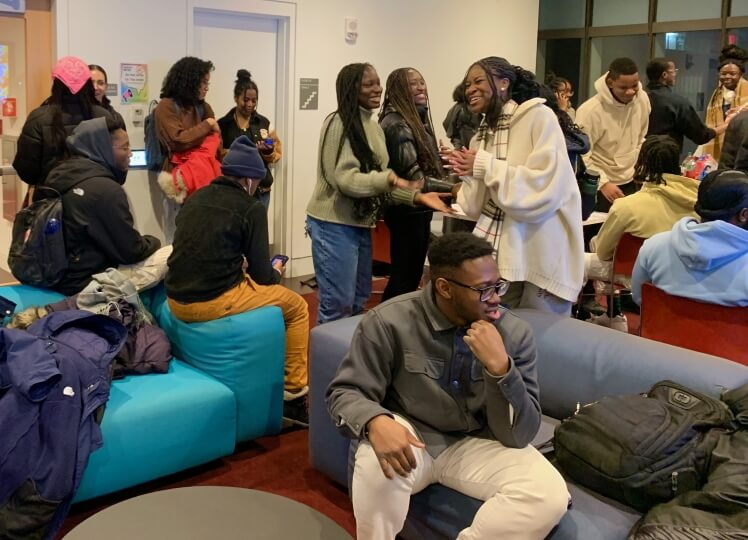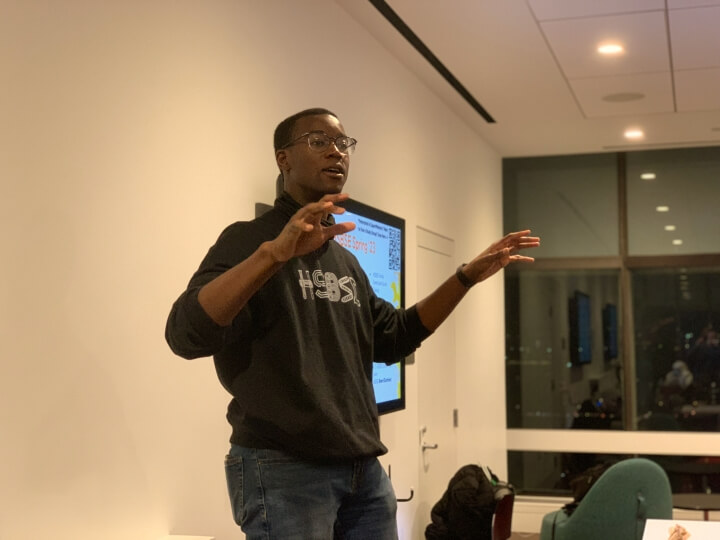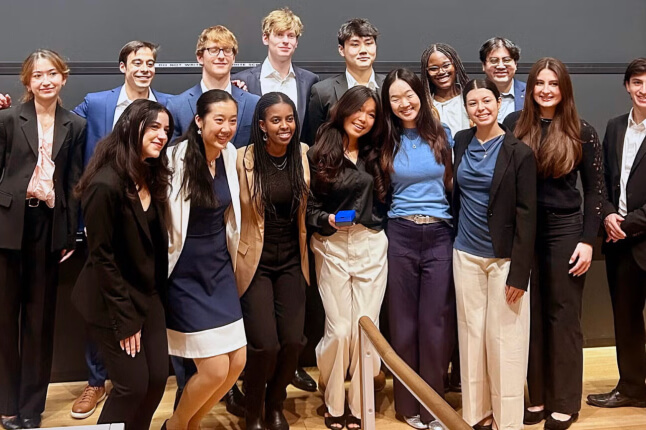News
Representation and diversity are constant challenges in the fields of science, technology, engineering and mathematics (STEM). Workers in STEM jobs are predominantly white, with only 9 percent of the workforce identifying as Black in 2021.
Members of the Harvard Society of Black Scientists and Engineers gather for their Spring Kickoff event at the Smith Campus Center. (Matt Goisman/SEAS)
Collegiate organizations like the Harvard Society of Black Scientists and Engineers (HSBSE) seek to increase Black representation in STEM by connecting members with potential internship or job opportunities, introducing members to mentors already working in their chosen fields, and creating a community where students can come together and support their joint academic interests.
“I think a lot of Black students at Harvard grew up in areas where there might not have been as many Black people in general, meaning not many Black people working in STEM,” said Tami Kabiawu, HSBSE Engineering Representative and computer science student at the Harvard John A. Paulson School of Engineering and Applied Sciences (SEAS). “So, a lot of students come to Harvard and they’ve never interacted with so many different Black people interested in the same things. It’s powerful.”
Kabiawu first discovered HSBSE at the student organization fair prior to the start of his first semester here. His experience growing up in New Jersey, where there were few opportunities to interact with other Black people interested in STEM, is one shared by many of his fellow board members.
“When I’d go to science competitions in high school in Wisconsin, I’d be surrounded by people from many different ethnicities, but not many Black students,” said Mya Johnson, HSBSE Secretary and second-year bioengineering student. “I didn’t really have a lot of exposure to other Black students who were as involved in STEM where I was. To finally get that opportunity as soon as I got to college, I was over the moon. This is a community, not a competition, and it’s all about bonding over the facts that we love STEM, are Black, and have this shared experience we’re trying to navigate.”
Along with fostering a supportive community, HSBSE also increases Black visibility in STEM. By getting connected to professional mentors already in the field, club members begin to see a path to the careers they want.
“Sometimes it feels very lonely in a space dominated by white people,” said first-year student Chinasa Ohajekwe. “This club makes me feel like I can do it. I look at the seniors who are about to graduate and look at how far they’ve come. I can see myself similarly getting to where I want to be over the next three years.”
Attendees receive their hot wings at the Spring Kickoff event for the Harvard Society of Black Scientists and Engineers at the Smith Campus Center. (Matt Goisman/SEAS)
HSBSE’s programming falls under three major categories: preprofessional, mentorship, and community-building. Preprofessional events include activity fairs, resume-building workshops and info sessions with organizations like NASA, Roblox and Vertex. The club also connects newer students to upperclassmen for guidance on navigating the Harvard experience, and this semester will start mentoring Black middle-school students in the Cambridge area through a partnership with the Phillips Brooks House Association. Community-building events include Problem Set Nights and the recent spring kickoff, a hot wings dinner patterned on the YouTube series “Hot Ones.” Members will also represent the club during National Engineers Week at the Boston Museum of Science later this month.
“It’s a very multi-dimensional organization,” said HSBSE President Clarence Ndubisi. “We have to make sure that we have a certain number of Problem Set Nights that are spaced out throughout the semester. We also want to cultivate the preprofessional aspect of our programming, so we want to make sure we’re getting good sponsors that are engaging and our members would really benefit from talking to. We also want to make sure we’re fostering a community.”
Harvard Society of Black Scientists and Engineers President Clarence Ndubisi addresses the crowd at the Spring Kickoff event at the Smith Campus Center. (Matt Goisman/SEAS)
Ndubisi said event attendance and enthusiasm was somewhat diminished last year due to COVID-19 restrictions severely limiting in-person gatherings on campus. But with those restrictions now largely gone, the club has thrived, with approximately 200 members and a schedule that’s on pace for the most events in a single school year in club history.
“When you have to have virtual events, it can hinder the bonds that can form within an organization,” said EJ Evans, club treasurer and second-year applied math student. “But this year, we’ve had far fewer restrictions, and were able to use some of the finances we couldn’t use last year to make some of this year’s events more interactive and fun. By shaping the culture around STEM, I believe we can increase the number of minorities in STEM fields.”
Along with being a SEAS-Affiliated Student Organization, HSBSE is also a chapter of the National Society of Black Engineers (NSBE). Ndubisi was inspired to run for chapter president because of his experience at last year’s NSBE convention in California, which also had an impact on current NSBE Senator Tiffany Kalu.
“It was my first time attending such a conference and it was amazing to meet so many companies and learn more about their visions,” said Kalu, a third-year environmental science and engineering concentrator. “It really opened my eyes to the many possible careers I could have with my environmental engineering degree. It was nice to connect with students from across the country and learn more about their experiences and backgrounds.”
Many HSBSE board members are more than a year away from graduation, so they haven’t had to make too many decisions yet about their future. But they all share one belief: thanks to HSBSE, they want to continue to promote Black participation in STEM long after they leave Harvard.
“This has been the best experience of my college career, eventually you should try to give back,” Ndubisi said. “Down the line, if HSBSE ever calls on me, I’ll be the first to pick up the phone, because mentorship is circular: it’s something you receive, then you give back.”
Topics: Belonging, Student Organizations
Cutting-edge science delivered direct to your inbox.
Join the Harvard SEAS mailing list.
Press Contact
Matt Goisman | mgoisman@g.harvard.edu






